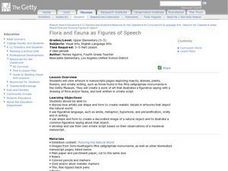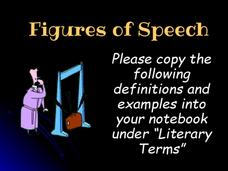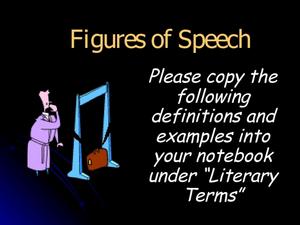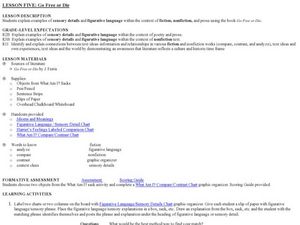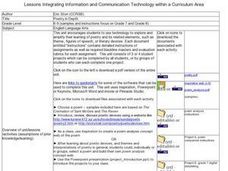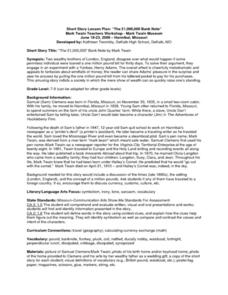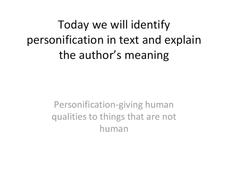Curated OER
Figures of Speech Slide Show
This slide show on figures of speech includes definitions, images, and examples from real texts for several common terms: metaphor, simile, personification, alliteration, irony, hyperbole, onomatopoeia, and imagery. The presentation is...
Curated OER
Figures of Speech: Quiz 2
Hyperbole, simile, metaphor, and personification are spotlighted on an online/interactive quiz. Test takers read short passages and then identify the figures of speech used.
Curated OER
Flora and Fauna as Figures of Speech
What a lovely way to incorporate artwork into your language arts lesson. View artwork in illustrated manuscript pages, depicting insects, animals, plants, flowers, and ornate writing in the Getty Museum. Practice using figurative...
Curated OER
Figures of Speech
Give your learners quick definitions of simile, metaphor, and analogy. As the first slide in this PowerPoint suggests, you can use the presentation as a warm-up and have scholars record the words and their meanings in a Literary Terms...
Loudoun County Public Schools
Figurative Language Packet
A definitive resource for your figurative language unit includes several worksheets and activities to reinforce writing skills. It addresses poetic elements such as simile and metaphor, personification, hyperbole, and idioms, and...
Curated OER
Figures of Speech Presentation
If used as part of an exploration of figures of speech, this short presentation defining similes, metaphors, and analogies could be used as a review tool in an English classroom. A teacher could augment this resource with more examples...
Curated OER
Go Free or Die: Figurative Language
Figures of speech, sensory details, and academic language are all targeted while reading Chapter Two of J. Ferris’ Go Free or Die. First, learners engage in an exercise to practice describing with detail. Then, partners use a...
Curated OER
Reading the Play
Do figures of speech enhance a play or story? In small groups, learners locate and describe figures of speech they find while reading a reader's theater play. After making predictions, they describe how the figures of speech make the...
Curated OER
Poetry in Depth
Scholars use technology to explore poetry and its related elements, such as theme, figures of speech, and other literary devices. They complete four poetry projects including a poem analysis with a concept web, an interactive poem...
Curated OER
Edward Lear, Limericks, and Nonsense
Introduce your class to the delights of nonsense poetry and explore literary devices with the writing of Edward Lear. Learners identify rhyme and meter as well as figures of speech, alliteration, and onomatopoeia in "The Owl and the...
Curated OER
Let's Focus on Idioms
Get online and explore idioms. Your class will use the Internet to locate, choose, and illustrate their favorite idioms. They make a class PowerPoint with illustrations for their idioms and explain the meaning of each. A great way to...
Curated OER
Setting the Tone with Figurative Language
Explore figurative language with your secondary class. Extending a language arts unit, the lesson prompts middle schoolers to examine how an author's word choice establishes a story's tone, possibly using metaphors, similes,...
Curated OER
Figurative Language in Romeo and Juliet
Shakespeare was such a talented writer, but why? It must be his use of figurative language, blended with his clever, twisting plots. This worksheet focuses on his use of metaphor, simile, personification, oxymoron, and hyperbole within...
Texas Education Agency (TEA)
Syntax (English II Reading)
Lesson five in the series focuses on syntax and the elements that make sentences enjoyable. Learners practice building different clauses and phrases and using figures of speech and rhetorical and literary devices.
Curated OER
Reading Poetry
Present your class with an overview of poetry-related information. The slides are clearly organized by topic, starting with reading poetry, ending with myths, and touching on everything from the five senses to open and closed forms of...
Curated OER
"The 1,000,000 Pound Bank Note" by Mark Twain
Compare real events from Mark Twain's life to events in the story. Middle school readers identify point-of-view, its purpose, and its reliability by citing two examples. They describe the tone of the story using four examples and...
Curated OER
Idioms: Get the Ball Rolling
Based on books written by Fred Gwynne, particularly A Little Pigeon Toad, this resource connects the language of idioms and figures of speech with visuals that make explicit the often humorous connections between the literal and...
Mailbox Education Center
On the Hunt: Understanding Figurative Language
Young writers hunt for examples of figurative language in their reading. The hunt requires pupils to cite their sources, record a quoted example for each type of figurative language, and an explanation of what they think the...
Curated OER
Figures of Speech Review and Assessment
Identify the figure of speech in given sentences. Your seventh grade will write an eight line paragraph using the four figures of speech at lest once. By using narrative, expository or persuasive paragraphs to complete worksheets...
Curated OER
Simile and Metaphor
Middle schoolers use context clues to find the figurative meaning of similes and metaphors in writing. They practice using figurative language to help their writing come alive. Use this activity in a lesson about poetry, figurative...
Curated OER
Personification
Introduce your young scholars to personification. The literary device is clearly defined and illustrated with clever examples. Opportunities for guided and independent practice using poems by Emily Dickinson and Langston Hughes are also...
Curated OER
Common Idioms 5
If you have been analyzing idioms, you can assess your learners' grasp of their figurative meanings with this 10-question matching exercise. Or you could give the sheet to groups to foster discussion about literal versus figurative...
Curated OER
Creating Civic Awareness Through Artistic and Literary Forms
Interpret current events using editorial cartoons and other print media. Middle schoolers explore the meanings of literary and artistic terms such as satire, irony, and caricature. They visit internet sites to develop an understanding of...
Curated OER
What Makes Jokes Funny?
Explore how language is used for comic effect. Middle schoolers determine which of the three formulas for jokes (double meanings, unexpected outcome, humorous mental image) make each of 18 classic, corny examples funny. They complete a...




